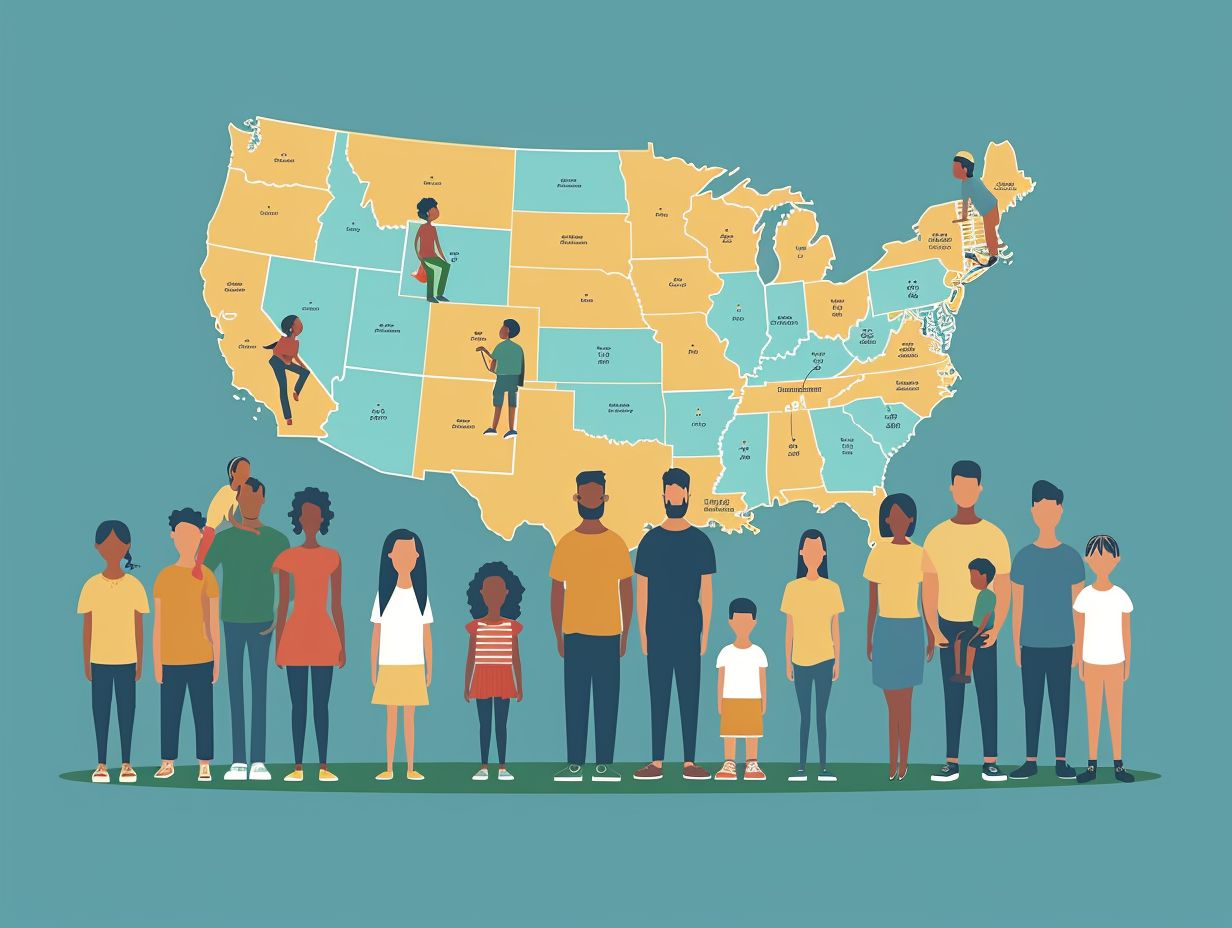Are you looking to bring a family member to Florida through the family-based immigration process but unsure where to start?
This comprehensive guide will walk you through the entire process, from who is eligible to the required documents and the rights and benefits of family-based immigrants in Florida.
Whether you’re filing a petition, going through visa processing, or adjusting status, this article covers everything you need to know to successfully navigate the family-based immigration process in Florida.
Key Takeaways:
- Family-based immigration allows US citizens and permanent residents to sponsor their qualifying relatives to live in Florida.
- A qualifying relative is a spouse, parent, child, or sibling of the sponsor who meets specific requirements.
- The family-based immigration process involves filing a petition, approval, visa processing, and either adjustment of status or consular processing.
What is Family-Based Immigration?
Family-based immigration plays a crucial role in U.S. immigration law, enabling U.S. citizens and permanent residents to request for their relatives to accompany them in Florida. This process is carried out through particular petitions and consists of several steps intended to guarantee that each application undergoes a comprehensive evaluation by the USCIS.
Who is Eligible for Family-Based Immigration in Florida?
Family-based immigration eligibility in Florida encompasses immediate relatives of U.S. citizens, including spouses, children, and parents, along with specific preference categories that extend to siblings and other family members.
What is the Definition of a ‘Qualifying Relative’?
A ‘qualifying relative‘ according to USCIS for family-based immigration consists of spouses, children, parents, and, in certain instances, siblings of U.S. citizens and permanent residents.
Immediate relatives, such as spouses, unmarried children under 21, and parents of U.S. citizens, are prioritized in the application process and are exempt from waiting in preference categories. On the contrary, relatives falling under preference categories, like married children of U.S. citizens or siblings of U.S. citizens, encounter lengthier wait times due to yearly visa constraints.
For a family member to be eligible, they must satisfy specific criteria, including demonstrating the relationship, financial support, and meeting other requirements established by USCIS.
What are the Requirements for Sponsorship?
Sponsorship for family-based immigration involves the U.S. citizen or permanent resident meeting specific financial requirements, which includes submitting an affidavit of support to demonstrate the capacity to financially assist the relative.
The affidavit of support plays a critical role in evidencing the sponsor’s dedication to offering financial help to the immigrant family member. Plus the affidavit, sponsors must present evidence of their income, employment status, and overall financial security.
Fulfilling these criteria is crucial to provide assurance to immigration authorities that the sponsored individual will not become a public charge and will possess adequate financial means to support themselves in the United States. Meeting legal obligations such as signing Form I-864, Affidavit of Support, is necessary to adhere to immigration laws and ensure the sponsorship process’s success.
What are the Steps for the Family-Based Immigration Process?
The family-based immigration process includes multiple essential steps, beginning with submitting the required petition, progressing to petition approval, and culminating in visa processing and either adjustment of status or consular processing.
1. Filing the Petition
The initial step in the family-based immigration process involves submitting a petition, usually Form I-130, to establish a qualifying relationship between the petitioner and the beneficiary.
This form is fundamental to the sponsorship process, illustrating the familial connection between the individual who wishes to bring their family member to the United States. It is important to provide precise and comprehensive information when filling out Form I-130, as any inaccuracies or omissions may result in delays or denials.
Obtaining guidance from a knowledgeable immigration attorney can be highly beneficial in navigating this intricate process, ensuring that all required documentation is accurately compiled and submitted for evaluation by the U.S. Citizenship and Immigration Services (USCIS).
2. Approval of the Petition
After the petition is filed, USCIS will assess the submitted documents and inform the petitioner of the approval, an important step that advances the process to visa processing.
Once the petitioner receives the approval notification, attention turns to the subsequent stages in the immigration process. Processing times after approval can differ but typically include collecting additional documentation, undergoing medical examinations, and attending interviews.
USCIS is responsible for providing comprehensive guidance on the necessary requirements for the visa application. It is crucial for the petitioner to carefully adhere to these instructions to facilitate a seamless progression towards acquiring the desired visa.
3. Visa Processing
Following petition approval, the case is sent to the National Visa Center (NVC) for visa processing, where the beneficiary readies for consular processing or adjustment of status, depending on their circumstances.
The NVC fulfills a crucial role in the visa application process by compiling all necessary documentation, conducting initial reviews, and facilitating communication among the applicant, petitioner, and the U.S. embassy or consulate.
For consular processing, applicants must compile documents such as a valid passport, birth certificates, police certificates, and medical examination reports. Conversely, those choosing adjustment of status must submit forms, supporting evidence, and undergo biometrics collection within the U.S.
4. Adjustment of Status or Consular Processing
The final step in the family-based immigration process involves either adjustment of status, where the immigrant already in the U.S. files Form I-485, or consular processing if they are outside the U.S.
Adjustment of status refers to the process by which an eligible individual can apply for lawful permanent resident status without leaving the United States. This option is available to those who are physically present in the U.S. and qualify to adjust their status based on a family relationship.
On the other hand, consular processing requires the immigrant to attend an interview at a U.S. embassy or consulate in their home country. The main difference lies in where the final processing and approval take place, either within the U.S. through USCIS for adjustment of status, or through the Department of State for consular processing.
What Documents are Required for Family-Based Immigration?
Family-based immigration necessitates a thorough collection of documents to verify the relationship, financial capacity, and health status of the applicant, in accordance with USCIS regulations.
1. Proof of Relationship
Evidence of relationship is an important document in family-based immigration, often consisting of birth certificates, marriage certificates, and other legal documents to confirm the familial connection.
These documents are crucial in establishing the authenticity of the relationship between family members who are looking to immigrate together. Birth certificates are used to confirm parent-child relationships, while marriage certificates validate spousal connections.
Adoption papers are utilized to verify legal parent-child relationships. Additionally, affidavits from family members or friends may be included as supplementary evidence of the relationship.
Providing precise and comprehensive proof of relationship is vital for a successful immigration application process and assists the USCIS in ensuring that only legitimate family ties are taken into account for immigration benefits.
2. Affidavit of Support
The affidavit of support, typically submitted using Form I-864, is necessary to prove that the sponsor possesses the financial means to assist the immigrant, preventing them from becoming a burden on public resources.
This form plays a crucial role in the immigration process by providing assurance to the U.S. government that the immigrant will have the required financial support to sustain themselves without needing public aid. The sponsor must meet specific income criteria based on household size to ensure they can fulfill their obligations as specified in the affidavit.
Form I-864 acts as a legally binding agreement between the sponsor and the U.S. government, emphasizing the sponsor’s commitment to financially supporting the immigrant until they attain lawful permanent resident status.
3. Biographic Information Forms
Biographic information forms, including Form G-325A, are used to collect personal and historical data about the applicant, aiding USCIS in conducting thorough background checks.
These forms are essential in the immigration application process, ensuring that the US government has a comprehensive understanding of an individual’s background. They typically request details such as full name, date of birth, address history, employment history, marital status, family members, and other relevant information.
Accurate completion of these forms helps USCIS verify identities, confirm eligibility for immigration benefits, and evaluate any potential security risks. It is important that the information provided is truthful and current to prevent delays or complications in the application process.
4. Medical Examination Results
Medical examination results are a required component of the application process. These examinations are conducted by a physician approved by USCIS to ensure that the immigrant meets health standards, and the findings are documented on Form I-693.
During the medical examination, the physician will evaluate various aspects of the applicant’s health, including vaccinations, physical condition, and mental well-being.
To find a USCIS-approved physician, individuals can contact the nearest designated civil surgeon authorized to conduct immigration medical exams. It is important to confirm that the chosen physician is listed as an approved provider to prevent any complications during the application process.
The information recorded on Form I-693 encompasses the outcomes of the medical examination, vaccination history, and any other pertinent health data required by USCIS.
What are the Rights and Benefits of Family-Based Immigrants in Florida?
Family-based immigrants in Florida have access to various rights and benefits, such as the option to secure permanent residency, work authorization, and the ability to sponsor additional family members for immigration purposes.
1. Work Authorization
Work authorization enables immigrants to legally work in the United States, typically granted through an Employment Authorization Document (EAD) issued by USCIS.
The process of obtaining work authorization involves submitting specific forms to USCIS, which include demonstrating eligibility based on factors such as visa status or asylum grounds. Once approved, the EAD serves as proof of the individual’s right to work in the U.S. Immigrants with work authorization can secure jobs, contribute to the economy through taxes, and help meet labor demands in various industries.
This authorization also benefits businesses by enabling them to access a diverse pool of skilled workers, ultimately enriching the workforce and driving economic growth.
2. Permanent Residency
Achieving permanent residency, often represented by obtaining a green card, allows family-based immigrants to live and work in the U.S. indefinitely, offering stability and long-term settlement opportunities.
As individuals secure permanent residency status, they gain access to various benefits, such as the ability to travel in and out of the country without needing a visa, eligibility for social security benefits, and the option to sponsor family members for their green cards.
Obtaining a green card can result in increased employment opportunities, as many employers favor candidates with permanent residency because of the stability it provides. Along with these benefits come certain responsibilities, like maintaining lawful permanent resident status by following U.S. laws and tax regulations.
3. Ability to Sponsor Other Family Members
A significant benefit of obtaining permanent residency or citizenship is the ability to sponsor other family members for immigration, which can facilitate family reunification.
To sponsor additional family members, the sponsor must meet specific requirements established by immigration authorities.
These requirements may include demonstrating financial stability to support the sponsored relatives, providing evidence of the relationship, and ensuring that the sponsored individuals meet the necessary health and character standards. The sponsor plays a critical role in the process by committing to providing financial and emotional support to their family members upon their arrival in the new country.
Family reunification is a fundamental component of immigration policy, with the goal of preserving and strengthening familial bonds in a new cultural environment.
Frequently Asked Questions
What is Florida’s family-based immigration process?
Florida’s family-based immigration process is a way for United States citizens and lawful permanent residents who live in Florida to sponsor certain relatives to come and live in the state as permanent residents.
Who can sponsor a family member through Florida’s family-based immigration process?
Only United States citizens and lawful permanent residents who live in Florida are eligible to sponsor certain family members through the state’s family-based immigration process.
What family members can be sponsored through Florida’s family-based immigration process?
Eligible family members for sponsorship through Florida’s family-based immigration process include spouses, children, parents, and siblings of United States citizens and unmarried children of lawful permanent residents.
What is the first step in Florida’s family-based immigration process?
The first step in Florida’s family-based immigration process is for the sponsor to file a petition with the United States Citizenship and Immigration Services (USCIS) to establish that the relationship with the family member exists and is eligible for immigration benefits.
What is the next step after the petition is approved in Florida’s family-based immigration process?
After the petition is approved by USCIS, the family member must wait for a visa to become available based on their relationship to the sponsor. This wait time can vary depending on the family member’s relationship to the sponsor and their country of origin.
Is it necessary for the sponsor to have a specific income level to qualify for Florida’s family-based immigration process?
Yes, the sponsor must meet certain income requirements to demonstrate that they can financially support the family member they are sponsoring. If the sponsor does not meet these requirements, they may need to find a joint sponsor who can meet the income requirements.

























Rate this article:
No Comments yet!